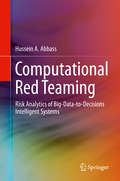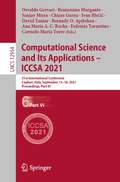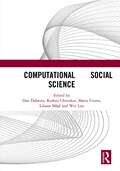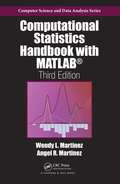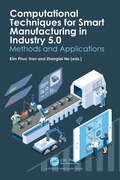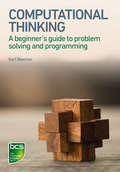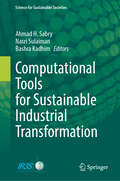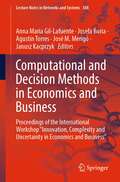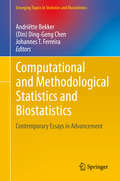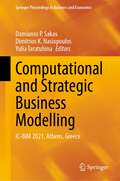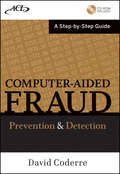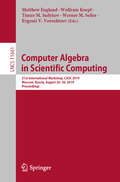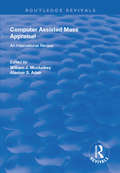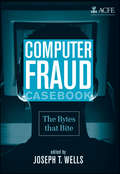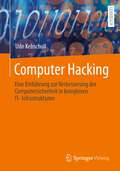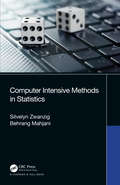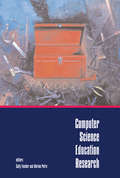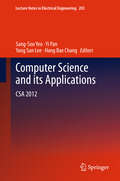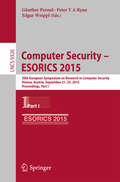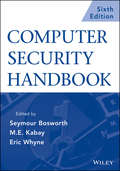- Table View
- List View
Computational Red Teaming: Risk Analytics of Big-Data-to-Decisions Intelligent Systems
by Hussein A. AbbassWritten to bridge the information needs of management and computational scientists, this book presents the first comprehensive treatment of Computational Red Teaming (CRT). The author describes an analytics environment that blends human reasoning and computational modeling to design risk-aware and evidence-based smart decision making systems. He presents the Shadow CRT Machine, which shadows the operations of an actual system to think with decision makers, challenge threats, and design remedies. This is the first book to generalize red teaming (RT) outside the military and security domains and it offers coverage of RT principles, practical and ethical guidelines. The author utilizes Gilbert's principles for introducing a science. Simplicity: where the book follows a special style to make it accessible to a wide range of readers. Coherence: where only necessary elements from experimentation, optimization, simulation, data mining, big data, cognitive information processing, and system thinking are blended together systematically to present CRT as the science of Risk Analytics and Challenge Analytics. Utility: where the author draws on a wide range of examples, ranging from job interviews to Cyber operations, before presenting three case studies from air traffic control technologies, human behavior, and complex socio-technical systems involving real-time mining and integration of human brain data in the decision making environment.
Computational Science and Its Applications – ICCSA 2021: 21st International Conference, Cagliari, Italy, September 13–16, 2021, Proceedings, Part VI (Lecture Notes in Computer Science #12954)
by Osvaldo Gervasi Beniamino Murgante Sanjay Misra Ana Maria A. C. Rocha David Taniar Bernady O. Apduhan Eufemia Tarantino Chiara Garau Ivan Blečić Carmelo Maria TorreThe ten-volume set LNCS 12949 – 12958 constitutes the proceedings of the 21st International Conference on Computational Science and Its Applications, ICCSA 2021, which was held in Cagliari, Italy, during September 13 – 16, 2021. The event was organized in a hybrid mode due to the Covid-19 pandemic.The 466 full and 18 short papers presented in these proceedings were carefully reviewed and selected from 1588 submissions. Part VI of the set includes the proceedings of the following workshops: International Workshop on Digital Transformation and Smart City (DIGISMART 2021); International Workshop on Econometrics and Multidimensional Evaluation in Urban Environment (EMEUE 2021); International Workshop on Transformational Urban Mobility: Challenges and Opportunities During and Post COVID Era (FURTHER2021); International Workshop on Geodesign in Decision Making: meta planning and collaborative design for sustainable and inclusive development (GDM 2021);11th International Workshop on Future Computing System Technologies and Applications (FiSTA 2021); International Workshop on Geographical Analysis, Urban Modeling, Spatial Statistics (GEOG-AND-MOD 2021).
Computational Social Science: Proceedings of the 2nd International Conference on New Computational Social Science (ICNCSS 2021), October 15-17, 2021, Suzhou, Jiangsu, China
by Wei Luo Dan Dobrota Roshan Chitrakar Ciurea Maria Liliana MâţâThe proceedings publish selected papers from the 2nd International Conference on New Computational Social Science, focusing on the following five aspects: Big data acquisition and analysis, Integration of qualitative research and quantitative research, Sociological Internet experiment research, Application of ABM simulation method in Sociology Research, Research and development of new social computing tools. With the rapid development of information technology, especially sweeping progress in the Internet of things, cloud computing, social networks, social media and big data, social computing, as a data-intensive science, is an emerging field that leverages the capacity to collect and analyze data with an unprecedented breadth, depth and scale. It represents a new computing paradigm and an interdisciplinary field of research and application. A broad comprehension of major topics involved in social computing is important for both scholars and practitioners. This proceedings presents and discusses key concepts and analyzes the state-of-the-art of the field. The conference not only gave insights on social computing, but also affords conduit for future research in the field. Social computing has two distinct trends: One is on the social science issues, such as computational social science, computational sociology, social network analysis, etc; the other is on the use of computational techniques. Finally, some new challenges ahead are summarized, including interdisciplinary cooperation and training, big data sharing for scientific data mashups, and privacy protect.
Computational Statistics Handbook with MATLAB (Chapman & Hall/CRC Computer Science & Data Analysis)
by Wendy L. Martinez Angel R. MartinezA Strong Practical Focus on Applications and AlgorithmsComputational Statistics Handbook with MATLAB, Third Edition covers today's most commonly used techniques in computational statistics while maintaining the same philosophy and writing style of the bestselling previous editions. The text keeps theoretical concepts to a minimum, emphasizing the i
Computational Techniques for Smart Manufacturing in Industry 5.0: Methods and Applications
by Zhenglei HeWe are witnessing rapid development in computational technologies and its applications in industry, leading to the 5th industrial revolution. Industry 5.0 is characterized by the synergies between machines and humans, with an aim to add value to production by creating personalized products able to meet customers' requirements. These intelligent manufacturing systems have been sought in various sectors (e.g. automobiles, power supplying, chemistry) to realize data-driven innovations for delivering highly customizable products and services faster, cheaper, better, and greener.This book presents recent advancements in research, new methods and techniques, and applications of advanced computational technologies in intelligent manufacturing for modeling, simulating, optimization, decision making, and other typical issues in manufacturing processes. It stimulates the scientific exchange of ideas and experiences in the field of intelligent manufacturing applications. Researchers and practitioners alike will benefit from this book to enhance their understanding of Industry 5.0, which focuses on combining human creativity and craftsmanship with the speed, productivity, and consistency of AI systems. Real-world case studies in various fields and practical applications are provided in each chapter.
Computational Thinking: A Beginner's Guide to Problem-Solving and Programming
by Karl BeecherComputational thinking is a timeless, transferable skill that enables you to think more clearly and logically, as well as a way to solve specific problems. <p><p> Beginning with the core ideas of computational thinking, with this book you'll build up an understanding of the practical problem-solving approach and explore how computational thinking aids good practice in programming, complete with a full guided example.
Computational Tools for Sustainable Industrial Transformation (Science for Sustainable Societies)
by Nasri Sulaiman Ahmad H. Sabry Bashra KadhimThis book discusses how computational tools are revolutionizing sustainable industrial transformation. By integrating advanced technologies such as big data analytics, machine learning, digital twins, and IoT, this volume provides a comprehensive guide to optimizing industrial processes for enhanced efficiency and reduced environmental impact. The chapters cover critical topics including the principles of industrial efficiency, the application of digital twins in manufacturing, and the application of machine learning and AI for process optimization and predictive maintenance. Readers will also explore the benefits of big data analytics in monitoring sustainability metrics and the role of IoT in smart sensor networks. Through real-world case studies and expert contributions, this book offers actionable insights into how computational tools can revolutionize industrial practices. The material presented significantly advances sustainability science by addressing key challenges and opportunities in the transition towards smart and sustainable societies. Through the integration of computational methods with industrial transformation, the book offers innovative solutions to pressing sustainability issues such as resource depletion, environmental degradation, and social inequality. Designed for industrial engineers, managers, and academics across disciplines such as engineering, environmental science, and business management, this book offers practical guidance on implementing computational techniques to optimize processes and reduce environmental impact. It invites readers to think through critical questions about sustainable practices and provides actionable insights that can be directly applied within industrial settings. By bridging theoretical knowledge with practical application, this book serves as an essential resource for professionals seeking to drive sustainable change in industry.
Computational and Decision Methods in Economics and Business: Proceedings of the International Workshop “Innovation, Complexity and Uncertainty in Economics and Business” (Lecture Notes in Networks and Systems #388)
by Anna Maria Gil-Lafuente Janusz Kacprzyk José M. Merigó Josefa Boria Agustín TorresThis book presents different topics related to innovation, complexity, uncertainty, modeling and simulation, fuzzy logic, decision-making, aggregation operators, business and economic applications, among others. The chapters are the results of research presented at the International Workshop "Innovation, Complexity and Uncertainty in Economics and Business", held in Barcelona, in November 2019, by The Ibero-American Network for Competitiveness, Innovation and Development (REDCID in Spanish) and the Royal Academy of Economic and Financial Sciences (RACEF in Spanish). These papers are useful for junior and senior researchers in the area of economics and business.
Computational and Methodological Statistics and Biostatistics: Contemporary Essays in Advancement (Emerging Topics in Statistics and Biostatistics)
by Din Ding-Geng Chen Andriëtte Bekker Johannes T. FerreiraIn the statistical domain, certain topics have received considerable attention during the last decade or so, necessitated by the growth and evolution of data and theoretical challenges. This growth has invariably been accompanied by computational advancement, which has presented end users as well as researchers with the necessary opportunities to handle data and implement modelling solutions for statistical purposes.Showcasing the interplay among a variety of disciplines, this book offers pioneering theoretical and applied solutions to practice-oriented problems. As a carefully curated collection of prominent international thought leaders, it fosters collaboration between statisticians and biostatisticians and provides an array of thought processes and tools to its readers. The book thereby creates an understanding and appreciation of recent developments as well as an implementation of these contributions within the broader framework of both academia and industry.Computational and Methodological Statistics and Biostatistics is composed of three main themes:• Recent developments in theory and applications of statistical distributions;• Recent developments in supervised and unsupervised modelling;• Recent developments in biostatistics;and also features programming code and accompanying algorithms to enable readers to replicate and implement methodologies. Therefore, this monograph provides a concise point of reference for a variety of current trends and topics within the statistical domain. With interdisciplinary appeal, it will be useful to researchers, graduate students, and practitioners in statistics, biostatistics, clinical methodology, geology, data science, and actuarial science, amongst others.
Computational and Strategic Business Modelling: IC-BIM 2021, Athens, Greece (Springer Proceedings in Business and Economics)
by Damianos P. Sakas Dimitrios K. Nasiopoulos Yulia TaratuhinaThis book presents advanced methods in business intelligence models that are applicable in research areas of business and enterprise research such as business informatics, e-business, customer behavior and agricultural business. Featuring selected contributions presented at the 2021 International Conference on Business Intelligence and Modelling (IC-BIM) held in Athens, Greece, this book analyses a series of issues and tools for business intelligence in everyday business operations. The International Conference on Business Intelligence and Modelling (IC-BIM) started in 2011 and is an international interdisciplinary conference focusing on the theoretical approach of the contemporary issues evolved in business intelligence and modelling and the integration of theory and practice.
Computer Accounting with QuickBooks Online
by Donna KayGain a competitive advantage – learn a leading online financial app for entrepreneurs with Computer Accounting with QuickBooks Online. Designed using the most effective way to learn QuickBooks Online, this text streamlines learning QuickBooks Online because it focuses on you―the learner. Proven instructional techniques are incorporated throughout the text to make your mastery of QuickBooks Online as effortless as possible. Using a hands-on approach, this text integrates understanding accounting with mastery of QuickBooks Online. Designed for maximum flexibility to meet your needs, Computer Accounting with QuickBooks Online can be used either in a QuickBooks Online course or independently at your own pace.
Computer Aided Fraud Prevention and Detection
by David Coderrebecome superhuman." -Richard B. Lanza, President, Cash Recovery Partners, LLC "Computer-Aided Fraud Prevention and Detection: A Step-by-Step Guide helps management and auditors answer T. S. Eliot's timeless question, 'Where is the knowledge lost in information?' Data analysis provides a means to mine the knowledge hidden in our information. Dave Coderre has long been a leader in educating auditors and others about Computer Assisted Audit Techniques. The book combines practical approaches with unique data analysis case examples that compel the readers to try the techniques themselves." -Courtenay Thompson Jr. Consultant, Courtenay Thompson & Associates
Computer Aided Fraud Prevention and Detection
by David CoderrePraise for Computer-Aided Fraud Prevention and Detection: A Step-by-Step Guide "A wonderful desktop reference for anyone trying to move from traditional auditing to integrated auditing. The numerous case studies make it easy to understand and provide a how-to for those?seeking to implement automated tools including continuous assurance. Whether you are just starting down the path or well on your way, it is a valuable resource." -Kate M. Head, CPA, CFE, CISA Associate Director, Audit and Compliance University of South Florida "I have been fortunate enough to learn from Dave's work over the last fifteen years, and this publication is no exception. Using his twenty-plus years of experience, Dave walks through every aspect of detecting fraud with a computer from the genesis of the act to the mining of data for its traces and its ultimate detection. A complete text that first explains how one prevents and detects fraud regardless of technology and then shows how by automating such procedures, the examiners' powers become superhuman." -Richard B. Lanza, President, Cash Recovery Partners, LLC "Computer-Aided Fraud Prevention and Detection: A Step-by-Step Guide helps management and auditors answer T. S. Eliot's timeless question, 'Where is the knowledge lost in information?' Data analysis provides a means to mine the knowledge hidden in our information. Dave Coderre has long been a leader in educating auditors and others about Computer Assisted Audit Techniques. The book combines practical approaches with unique data analysis case examples that compel the readers to try the techniques themselves." -Courtenay Thompson Jr. Consultant, Courtenay Thompson & Associates
Computer Algebra in Scientific Computing: 21st International Workshop, CASC 2019, Moscow, Russia, August 26–30, 2019, Proceedings (Lecture Notes in Computer Science #11661)
by Wolfram Koepf Werner M. Seiler Evgenii V. Vorozhtsov Matthew England Timur M. SadykovThis book constitutes the refereed proceedings of the 21st International Workshop on Computer Algebra in Scientific Computing, CASC 2019, held in Moscow, Russia, in August 2019.The 28 full papers presented together with 2 invited talks were carefully reviewed and selected from 44 submissions. They deal with cutting-edge research in all major disciplines of computer algebra. The papers cover topics such as polynomial algebra, symbolic and symbolic-numerical computation, applications of symbolic computation for investigating and solving ordinary differential equations, applications of CASs in the investigation and solution of celestial mechanics problems, and in mechanics, physics, and robotics.
Computer Assisted Mass Appraisal: An International Review (Routledge Revivals)
by William J. McCluskey Alastair AdairFirst published in 1997, this volume emerged in response to the need for material on the research, development, use and application of mass appraisal techniques for ad valorem property tax systems. The primary paradigms discussed include regression, base home technique, adaptive estimation procedure and artificial neural networks. Intending to address a wide range of property types, the authors explored residential, condominiums, retail, office and industrial property as well as agricultural and forestry land.
Computer Forensics
by Michael SheetzWould your company be prepared in the event of: * Computer-driven espionage * A devastating virus attack * A hacker's unauthorized access * A breach of data security? As the sophistication of computer technology has grown, so has the rate of computer-related criminal activity. Subsequently, American corporations now lose billions of dollars a year to hacking, identity theft, and other computer attacks. More than ever, businesses and professionals responsible for the critical data of countless customers and employees need to anticipate and safeguard against computer intruders and attacks. The first book to successfully speak to the nontechnical professional in the fields of business and law on the topic of computer crime, Computer Forensics: An Essential Guide for Accountants, Lawyers, and Managers provides valuable advice on the hidden difficulties that can blindside companies and result in damaging costs. Written by industry expert Michael Sheetz, this important book provides readers with an honest look at the computer crimes that can annoy, interrupt--and devastate--a business. Readers are equipped not only with a solid understanding of how computers facilitate fraud and financial crime, but also how computers can be used to investigate, prosecute, and prevent these crimes. If you want to know how to protect your company from computer crimes but have a limited technical background, this book is for you. Get Computer Forensics: An Essential Guide for Accountants, Lawyers, and Managers and get prepared.
Computer Forensics
by Nathan ClarkeHow would your organisation cope with a cyber attack? Pinpoint and close vulnerabilities using effective computer forensics!The primary purpose of computer forensics is to enable organisations to pinpoint where the malware has infected their computer systems and which files have been infected, so that they can close the vulnerability. More and more organisations have realised that they need to acquire a forensic capability to ensure they are ready to cope with an information security incident. This pocket guide illustrates the technical complexities involved in computer forensics, and shows managers what makes the discipline relevant to their organisation. For technical staff, the book offers an invaluable insight into the key processes and procedures that are required. Benefits to business include: * Defend your company effectively against attacks By developing a computer forensic capability, your organisation will be better prepared to defend itself in the event of a cyber attack. Surveys of the threat landscape have indicated a significant upswing of insider activity. Forensics within the organisation can be used to identify possible insider misuse of systems or information. In addition, this pocket guide looks at how you can optimise your IT infrastructure so as to enhance the efficiency of incident analysis. This will also minimise the operational impact on your computer systems in the event that a forensic analysis is required. * Be proactive Being proactive does not just mean making sure your organisation's IT infrastructure is one that can support forensic analysis of incidents. Forensics is now no longer merely a tool to identify what has gone wrong: it can also be used as a mechanism for alerting you to the fact that something has gone wrong. Being proactive therefore implies stepping up your organisation's ability to detect attacks. Detection of attacks is an extremely useful attribute for your organisation to have: the sooner you know about the problem, the sooner you can begin to deal with it. * Secure evidence that will stand up in court Undertaking forensics is not a simple task. It is not always possible to understand the true consequences of insider misuse until after completion of the investigation. Once the extent of the damage becomes clear, you may want to exercise the option of taking legal action against the perpetrator. This means that it is essential for you to follow correct procedure, so as to safeguard any evidence gathered. This book explains the key steps you need to take to maintain the integrity of the investigation and preserve the evidence. * Counter encryption Encryption is a double-edged sword. Encryption has a legitimate purpose as a tool deployed by information security professionals. However, the opportunity to conceal data has obvious attractions for the criminal, meaning that encryption is also a technique widely used by hackers. This book looks at how encryption is used to impede a forensic investigation, and examines ways of solving the problem. The most effective tactic for countering encryption is to locate the key material and crack the password that protects it, using a password cracker such as Cain & Abel. Tools, techniques and proceduresThe underground economy makes millions of pounds a year from cybercrime. Because no system or network can be completely secure, any sensible organisation will have mechanisms in place in advance to deal with the consequences of a cyber attack. Digital forensics assists companies and public sector organisations to identify how and where their computer systems have been abused. The purpose of this pocket guide is to provide an introduction to the tools, techniques and procedures utilised within computer forensics. It is an easy to understand, introductory text, which gives an overview of the digital forensics domain, discussing procedural, technical and human-related aspects, without confiusing readers with technical jargon.
Computer Fraud Casebook: The Bytes that Bite
by Joseph T. WellsThis one-of-a-kind collection consists of actual cases written by fraud examiners out in the field. These cases were hand selected from hundreds of submissions and together form a comprehensive picture of the many types of computer fraud how they are investigated, across industries and throughout the world. Topics included are email fraud, on-line auction fraud, security breaches, counterfeiting, and others.
Computer Hacking: Eine Einführung zur Verbesserung der Computersicherheit in komplexen IT-Infrastrukturen
by Udo KebschullTechnische Maßnahmen, die es Cyberangreifern schwer machen, dienen zur Abschreckung, weil Hacker immer nur so hoch springen, wie sie müssen. Bei komplexen und vor allem sicherheitsrelevanten IT-Infrastrukturen reichen diese technischen Maßnahmen allein jedoch oft nicht aus.Dieses Lehrbuch betrachtet alle Aspekte der IT-Sicherheit und effektive Maßnahmen, um Angriffe zu detektieren und sich erfolgreich dagegen zu wehren. Es behandelt allgemeine Angriffsmechanismen und Angriffsszenarien, die von Angreifern angewendet werden. Dabei soll klar werden, dass es nicht ausreichend ist, Firewall-Regeln sauber zu konfigurieren oder die aktuellsten Patches einzuspielen. Vielmehr muss ein ganzheitlicher Ansatz gewählt werden, der Nutzende einschließt (Awareness) und funktionierende Prozesse für den Fall eines konkreten Angriffs etabliert. Das Buch zeigt, wo die Schwachstellen liegen, wie man sie schließt, wie man Angriffe erkennt und wie man sie erfolgreich abwehrt.
Computer Intensive Methods in Statistics
by Silvelyn Zwanzig Behrang MahjaniThis textbook gives an overview of statistical methods that have been developed during the last years due to increasing computer use, including random number generators, Monte Carlo methods, Markov Chain Monte Carlo (MCMC) methods, Bootstrap, EM algorithms, SIMEX, variable selection, density estimators, kernel estimators, orthogonal and local polynomial estimators, wavelet estimators, splines, and model assessment. Computer Intensive Methods in Statistics is written for students at graduate level, but can also be used by practitioners. Features Presents the main ideas of computer-intensive statistical methods Gives the algorithms for all the methods Uses various plots and illustrations for explaining the main ideas Features the theoretical backgrounds of the main methods. Includes R codes for the methods and examples Silvelyn Zwanzig is an Associate Professor for Mathematical Statistics at Uppsala University. She studied Mathematics at the Humboldt- University in Berlin. Before coming to Sweden, she was Assistant Professor at the University of Hamburg in Germany. She received her Ph.D. in Mathematics at the Academy of Sciences of the GDR. Since 1991, she has taught Statistics for undergraduate and graduate students. Her research interests have moved from theoretical statistics to computer intensive statistics. Behrang Mahjani is a postdoctoral fellow with a Ph.D. in Scientific Computing with a focus on Computational Statistics, from Uppsala University, Sweden. He joined the Seaver Autism Center for Research and Treatment at the Icahn School of Medicine at Mount Sinai, New York, in September 2017 and was formerly a postdoctoral fellow at the Karolinska Institutet, Stockholm, Sweden. His research is focused on solving large-scale problems through statistical and computational methods.
Computer Power Group: Designing Brand Architecture
by Susan Fournier Andrea WojnickiComputer Power Group (CPG), an Australian-based consulting, education, and staffing placement firm in the IT industry, is contemplating a brand architecture capable of structuring its eight branded business units. CEO Peter James is particularly curious about whether a corporate brand is needed to unify the businesses. Extensive consumer research is conducted to inform the branding initiative, providing insight into the meanings of each of the sub-brands in key stakeholders' minds. The architecture solution must consider not only brand meanings and associations, but market performance and brand stewardship concerns as well. A pending merger with U.S.-based Interim Technology further complicates the task.
Computer Science Education Research
by Marian Petre Sally FincherThis book provides an overview of how to approach computer science education research from a pragmatic perspective. It represents the diversity of traditions and approaches inherent in this interdisciplinary area, while also providing a structure within which to make sense of that diversity. It provides multiple 'entry points'- to literature, to me
Computer Science and its Applications: CSA 2012 (Lecture Notes in Electrical Engineering #203)
by Yi Pan Hang Bae Chang Sang-Soo Yeo Yang Sun LeeThe 4th FTRA International Conference on Computer Science and its Applications (CSA-12) will be held in Jeju, Korea on November 22~25, 2012. CSA-12 will be the most comprehensive conference focused on the various aspects of advances in computer science and its applications. CSA-12 will provide an opportunity for academic and industry professionals to discuss the latest issues and progress in the area of CSA. In addition, the conference will publish high quality papers which are closely related to the various theories and practical applications in CSA. Furthermore, we expect that the conference and its publications will be a trigger for further related research and technology improvements in this important subject. CSA-12 is the next event in a series of highly successful International Conference on Computer Science and its Applications, previously held as CSA-11 (3rd Edition: Jeju, December, 2011), CSA-09 (2nd Edition: Jeju, December, 2009), and CSA-08 (1st Edition: Australia, October, 2008).
Computer Security -- ESORICS 2015: 20th European Symposium on Research in Computer Security, Vienna, Austria, September 21-25, 2015, Proceedings, Part I (Lecture Notes in Computer Science #9326)
by Edgar Weippl Günther Pernul Peter Y A RyanThe two-volume set, LNCS 9326 and LNCS 9327 constitutes the refereed proceedings of the 20th European Symposium on Research in Computer Security, ESORICS 2015, held in Vienna, Austria, in September 2015. The 59 revised full papers presented were carefully reviewed and selected from 298 submissions. The papers address issues such as networks and Web security; system security; crypto application and attacks; risk analysis; privacy; cloud security; protocols and attribute-based encryption; code analysis and side-channels; detection and monitoring; authentication; policies; and applied security.
Computer Security Handbook, Set
by Eric Whyne Seymour Bosworth Michel E. KabayComputer security touches every part of our daily lives from our computers and connected devices to the wireless signals around us. Breaches have real and immediate financial, privacy, and safety consequences. This handbook has compiled advice from top professionals working in the real world about how to minimize the possibility of computer security breaches in your systems. Written for professionals and college students, it provides comprehensive best guidance about how to minimize hacking, fraud, human error, the effects of natural disasters, and more. This essential and highly-regarded reference maintains timeless lessons and is fully revised and updated with current information on security issues for social networks, cloud computing, virtualization, and more.
